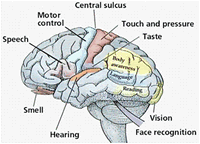Brain Support
 The brain is the most complex organ in the human body, and perhaps the most remarkable. It produces our every thought, action, memory, feeling and experience of the world. This jelly-like mass of tissue, weighing about 3 pounds, contains a staggering one hundred billion nerve cells, or neurons.
The brain is the most complex organ in the human body, and perhaps the most remarkable. It produces our every thought, action, memory, feeling and experience of the world. This jelly-like mass of tissue, weighing about 3 pounds, contains a staggering one hundred billion nerve cells, or neurons.
The complexity of the connectivity between these cells is mind-boggling. Each neuron can make contact with thousands or even tens of thousands of others, via tiny structures called synapses. Our brains form a million new connections for every second of our lives. The pattern and strength of the connections is constantly changing and no two brains are alike. It is in these changing connections that memories are stored, habits learned and personalities shaped, by reinforcing certain patterns of brain activity, and losing others.
Brain structure is shaped partly by genes, but largely by experience. The brain has bursts of growth and then periods of consolidation, when excess connections are eliminated. The most notable bursts are in the first two or three years of life, during puberty, and the final burst occurring in young adulthood. It was believed that after this point, brain cells slowly die off as you age and you would never get them back. This is not correct. Recently it was discovered that new brain cells are being born throughout our lives, a process called neurogenesis.
Fun Facts
- The slowest speed at which information travels between neurons is 416 km/h or 260 mph.
- Your brain is about 2% of your total body weight but uses 20% of your body's energy.
- The energy used by the brain is enough to light a 25 watt bulb.
- Albert Einsteins brain weighed 2.71 lbs, less than the average human, so it is not the size of the brain but the amount of connections within it that matter.
Health Conditions(omitting genetic disorders)
- Alzheimer's disease is a progressive brain disorder that impacts patients' memory and their ability to function normally. The disease affects reasoning ability and communication skills and may also cause personality and behavior changes, anxiety and irritability, or even delusions.
- Parkinson's disease is characterized by four main features: rigidity or stiffness of the arms, legs or neck; tremors, usually of the hands; bradykinesia or slowness and reduction of movement; and postural instability (loss of balance).
- Dementia is the name given to a group of conditions-Alzheimer disease and Parkinson disease among them-that destroy mental function by attacking brain cells. Vascular dementia results from reduced blood flow to the nerve cells of the brain.
- Cerebral aneurysm is a weak spot on the wall of a brain artery or vein (like the weak spot on the inner tube of a tire) that is prone to dilation, bulging, or ballooning.
- Pervasive developmental disorders cause delays in the development of basic skills, including emotional, behavioral and social skills. Among the numerous conditions that belong to this group of disorders are Asperger disorder, Rett syndrome and Autism.
- Epilepsy is a neurologic disorder that results in recurring disturbances of brain function that can cause impairment or loss of consciousness, as well as abnormal movements or behavior.
- A stroke results from the blocking of an artery (due to blood clot) or from the bursting of a blood vessel in the brain.
- Brain tumors are tumors of the brain. Each year, nearly 200,000 people in the United States are diagnosed with the more than 120 varieties of brain tumors-either primary or metastatic-and brain tumors are now the leading cause of solid tumor death among children under 20 years of age.
- Brain metastases are tumors that first grow in tissues elsewhere in the body before spreading to the brain.
- Adult hydrocephalus is a condition in which excessive cerebrospinal fluid (CSF) accumulates within the ventricles of the brain.
Suggestions To Strengthen
- Do not smoke or use tobacco
- Eat raw and living foods
- Exercise regularly
- Socialize and have fun
- Engage in mentally stimulating activities
- Maintain your role and sense of purpose
- Use all of your brain senses (see photo)
- Avoid clogged arteries
